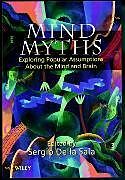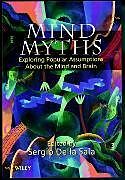Mind Myths
Einband:
Kartonierter Einband
EAN:
9780471983033
Untertitel:
Exploring Popular Assumptions About the Mind and Brain
Genre:
Psychologie & Esoterik
Autor:
Sergio Della Sala
Herausgeber:
John Wiley & Sons Inc
Anzahl Seiten:
240
Erscheinungsdatum:
30.03.1999
ISBN:
978-0-471-98303-3
Informationen zum Autor Professor Sergio Della Sala FBPsS, FRSA, FRSE is a neuropsychologist. Della Sala was Professor of Neuropsychology and Honorary Consultant in Neurology at the University of Aberdeen from January 1994 to March 2004. As of June 2017, he is with the University of Edinburgh. He has been the editor of Cortex since 2001. Klappentext Currently there is a gap between what scientists know about the mind and brain and the assumptions that others draw from sources of everyday information such as newspapers, popular press and television. Mind Myths attempts to close this gap by bringing together top international neuroscientists and psychologists to provide a fascinating and scientifically reliable insight into the neuropsychological and cognitive phenomena that are frequently reported in the media. A multitude of mind myth topics are tackled, for example the resuscitation from coma thanks to a patient's favourite songs the creativity of the right hemisphere the false memory syndrome the placebo effect learning while sleeping "Mind Myths ? includes the remarkably persistent fallacy that we only ever use 10% of our brains, the assumption that our right brains function as artistic hippies and our left as desiccated accountants ? the book is written in a lively style and will, I hope, be read widely by science journalists, and others who help perpetuate the various myths ? an excellent focus for an undergraduate seminar, providing a stimulating bridge between the psychological laboratory and the rather untilled field of folk psychology.?" From the Foreword by Alan Baddeley This unique book will appeal to professionals and students across the psychology and science disciplines and anyone else with an interest in how the brain works in everyday situations. Zusammenfassung Currently there is a gap between what scientists know aboutthe mind and brain and the assumptions that others draw from sources of everyday information such as newspapers! popular press and television. Inhaltsverzeichnis SECTION 1: BRAIN MYTHOLOGY. 1. Whence Cometh the Myth that We Only Use Ten Percent of Our Brain? (Barry Beyerstein). 2. Are We in Our Right Minds? (Michael C. Corballis). 3. Energy and the Brain: Facts and Fantasies (Fernando D. Saravi). 4. Pseudoscience and the Brain: Tuners and Tonics for Aspiring Superhumans (Barry L. Beyerstein). SECTION 2: THE TWILIGHT ZONE BETWEEN LIFE AND DEATH. 5. Near-Death Experience and Ecstasy: A Production of the Organisation of the Human Brain (Michael Persinger). 6. Lazarus Syndrome (Ennio De Renzi). SECTION 3: MYTHS ABOUT MEMORY AND CREATIVE THINKING. 7. Lie Down and Let Me Tell You About Your Childhood... (Maryanne Garry! Susan Frame and Elizabeth F. Loftus). 8. Repetita (Non) Iuvant (Robert H. Logie and Sergio Della Sala). 9. Creative Thinking: Myths and Misconceptions (K. Gilhooly). SECTION 4: CONTROVERSIAL ISSUES: CLONES! AGEING! AND HYPNOSIS. 10. The Myth of the Clonable Human Brain (G. Berlucchi). 11. When Age Is In! the Wit Is Out? (Pat Rabbitt). 12. Hypnosis (Graham F. Wagstaff). SECTION 5: THE MULTIFARIOUS ASPECTS OF DECEPTION. 13. I Shall Please: the Mysterious Power of Placebos (Edzard Ernst and Neil C. Abbott). 14. The Magicians Best-Kept Secrets (James Randi). 15.It s All in the Mind. On the Mechanisms of Deception in Psychic Fraud (Massimo Polidoro). 16.Recent Advances in Moving Backwards (Katharine M. Leafhead and Michael D. Kopelman). SECTION 6: MEDIA WATCH. 17. The Media and the Brain (Toby Howard and Steve Donnelly). ...
Klappentext
Currently there is a gap between what scientists know about the mind and brain and the assumptions that others draw from sources of everyday information such as newspapers, popular press and television. Mind Myths attempts to close this gap by bringing together top international neuroscientists and psychologists to provide a fascinating and scientifically reliable insight into the neuropsychological and cognitive phenomena that are frequently reported in the media. A multitude of mind myth topics are tackled, for example the resuscitation from coma thanks to a patient's favourite songs the creativity of the right hemisphere the false memory syndrome the placebo effect learning while sleeping "Mind Myths ? includes the remarkably persistent fallacy that we only ever use 10% of our brains, the assumption that our right brains function as artistic hippies and our left as desiccated accountants ? the book is written in a lively style and will, I hope, be read widely by science journalists, and others who help perpetuate the various myths ? an excellent focus for an undergraduate seminar, providing a stimulating bridge between the psychological laboratory and the rather untilled field of folk psychology.?" From the Foreword by Alan Baddeley This unique book will appeal to professionals and students across the psychology and science disciplines and anyone else with an interest in how the brain works in everyday situations.
Zusammenfassung
Currently there is a gap between what scientists know aboutthe mind and brain and the assumptions that others draw from sources of everyday information such as newspapers, popular press and television.
Inhalt
SECTION 1: BRAIN MYTHOLOGY; 1. Whence Cometh the Myth that We Only Use Ten Percent of Our Brain? (Barry Beyerstein); 2. Are We in Our Right Minds? (Michael C. Corballis); 3. Energy and the Brain: Facts and Fantasies (Fernando D. Saravi); 4. Pseudoscience and the Brain: Tuners and Tonics for Aspiring Superhumans (Barry L. Beyerstein); SECTION 2: THE TWILIGHT ZONE BETWEEN LIFE AND DEATH; 5. Near-Death Experience and Ecstasy: A Production of the Organisation of the Human Brain (Michael Persinger); 6. Lazarus Syndrome (Ennio De Renzi); SECTION 3: MYTHS ABOUT MEMORY AND CREATIVE THINKING; 7. Lie Down and Let Me Tell You About Your Childhood... (Maryanne Garry, Susan Frame and Elizabeth F. Loftus); 8. Repetita (Non) Iuvant (Robert H. Logie and Sergio Della Sala); 9. Creative Thinking: Myths and Misconceptions (K. Gilhooly); SECTION 4: CONTROVERSIAL ISSUES: CLONES, AGEING, AND HYPNOSIS; 10. The Myth of the Clonable Human Brain (G. Berlucchi); 11. When Age Is In, the Wit Is Out? (Pat Rabbitt); 12. Hypnosis (Graham F. Wagstaff); SECTION 5: THE MULTIFARIOUS ASPECTS OF DECEPTION; 13. I Shall Please: the Mysterious Power of Placebos (Edzard Ernst and Neil C. Abbott); 14. The Magicians Best-Kept Secrets (James Randi); 15.Its All in the Mind. On the Mechanisms of Deception in Psychic Fraud (Massimo Polidoro); 16.Recent Advances in Moving Backwards (Katharine M. Leafhead and Michael D. Kopelman); SECTION 6: MEDIA WATCH; 17. The Media and the Brain (Toby Howard and Steve Donnelly).

Leider konnten wir für diesen Artikel keine Preise ermitteln ...
billigbuch.ch sucht jetzt für Sie die besten Angebote ...
Die aktuellen Verkaufspreise von 6 Onlineshops werden in Realtime abgefragt.
Sie können das gewünschte Produkt anschliessend direkt beim Anbieter Ihrer Wahl bestellen.
Loading...
Die aktuellen Verkaufspreise von 6 Onlineshops werden in Realtime abgefragt.
Sie können das gewünschte Produkt anschliessend direkt beim Anbieter Ihrer Wahl bestellen.
| # | Onlineshop | Preis CHF | Versand CHF | Total CHF | ||
|---|---|---|---|---|---|---|
| 1 | Seller | 0.00 | 0.00 | 0.00 |
